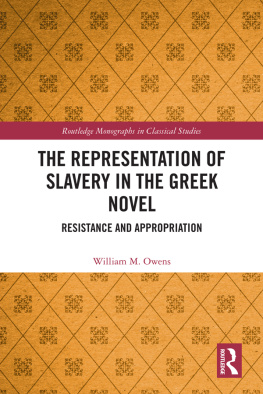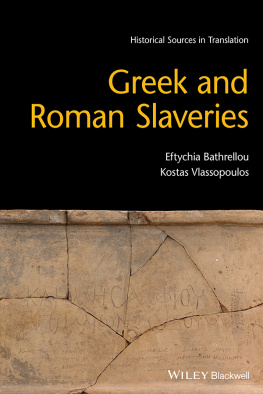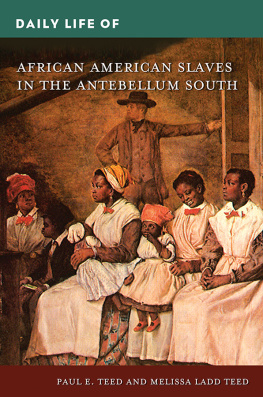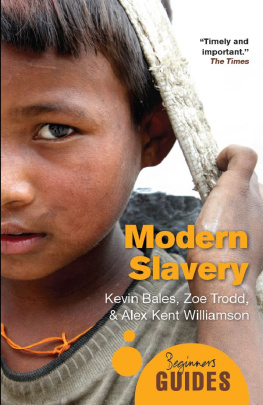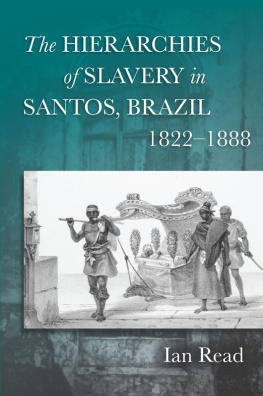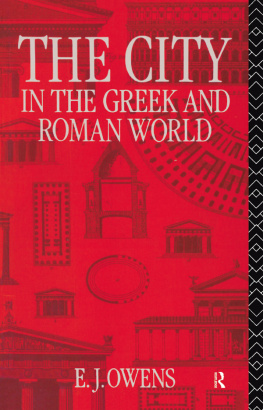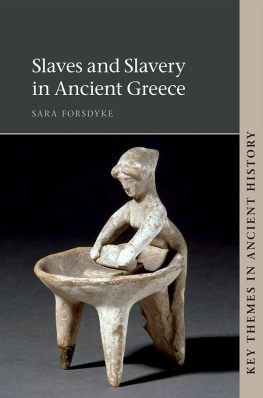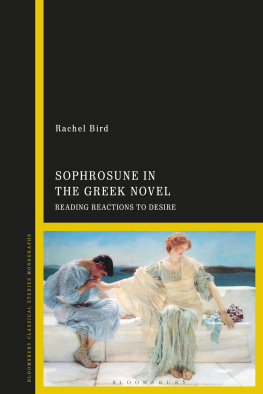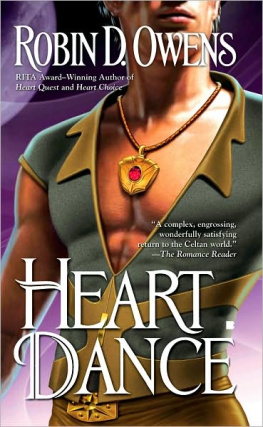The Representation of Slavery in the Greek Novel
This volume offers the first comprehensive treatment of how the five canonical Greek novels represent slaves and slavery. In each novel, one or both elite protagonists are enslaved, and Owens explores the significance of the genres regular social degradation of these members of the elite.
Reading the novels in the context of social attitudes and stereotypes about slaves, Owens argues for an ideological division within the genre: the earlier novelists, Xenophon of Ephesus and Chariton, challenge and undermine elite stereotypes; the three later novelists, Longus, Achilles Tatius, and Heliodorus, affirm them. The critique of elite thinking about slavery in Xenophon and Chariton opens the possibility that these earlier authors and their readers included literate ex-slaves. The interests and needs of these authors and their readers shaped the emerging genre and not only made the protagonists slavery a key motif but also made slavery itself a theme that helped define the genre.
The Representation of Slavery in the Greek Novel will be of interest not only to students of the ancient novel but also to anyone working on slavery in the ancient world.
William M. Owens is Associate Professor of Classics at Ohio University in Athens, Ohio. His research focuses on the representation of social institutions, practices, and ideologies in ancient literature, in particular comedy and the novel.
Routledge Monographs in Classical Studies
Titles include:
The Bible, Homer, and the Search for Meaning in Ancient Myths
Why We Would Be Better Off With Homers Gods
John Heath
Fantasy in Greek and Roman Literature
Graham Anderson
Piracy, Pillage, and Plunder in Antiquity
Appropriation and the Ancient World
Edited by Richard Evans and Martine de Marre
Romans at War
Soldiers, Citizens, and Society in the Roman Republic
Edited by Jeremy Armstrong and Michael P. Fronda
Discourse of Kingship in Classical Greece
Carol Atack
Emotional Trauma in Greece and Rome
Representations and Reactions
Edited by Andromache Karanika and Vassiliki Panoussi
The Representation of Slavery in the Greek Novel
Resistance and Appropriation
William M. Owens
Memories of Utopia
The Revision of Histories and Landscapes in Late Antiquity
Edited by Bronwen Neil and Kosta Simic
For more information on this series, visit: www.routledge.com/classicalstudies/series/RMCS
First published 2020
by Routledge
2 Park Square, Milton Park, Abingdon, Oxon OX14 4RN
and by Routledge
52 Vanderbilt Avenue, New York, NY 10017
Routledge is an imprint of the Taylor & Francis Group, an informa business
2020 William M. Owens
The right of William M. Owens to be identified as author of this work has been asserted by him in accordance with sections 77 and 78 of the Copyright, Designs and Patents Act 1988.
All rights reserved. No part of this book may be reprinted or reproduced or utilised in any form or by any electronic, mechanical, or other means, now known or hereafter invented, including photocopying and recording, or in any information storage or retrieval system, without permission in writing from the publishers.
Trademark notice: Product or corporate names may be trademarks or registered trademarks, and are used only for identification and explanation without intent to infringe.
British Library Cataloguing-in-Publication Data
A catalogue record for this book is available from the British Library
Library of Congress Cataloging-in-Publication Data
Names: Owens, William M., author.
Title: The representation of slavery in the Greek novel : resistance and
appropriation / William M. Owens.
Other titles: Routledge monographs in classical studies.
Identifiers: LCCN 2019036082 (print) | LCCN 2019036083 (ebook) |
ISBN 9780367348755 (hardback) | ISBN 9780429328558 (ebook)
Subjects: LCSH: Greek prose literatureHistory and criticism. |
Slavery in literature.
Classification: LCC PA3257 .O94 2019 (print) | LCC PA3257 (ebook) |
DDC 883.009/3582dc23
LC record available at https://lccn.loc.gov/2019036082
LC ebook record available at https://lccn.loc.gov/2019036083
ISBN: 978-0-367-34875-5 (hbk)
ISBN: 978-0-429-32855-8 (ebk)
Typeset in Times New Roman
by Apex CoVantage, LLC
For Kay
I became interested in the Greek novel through my reading in the history of Roman slavery. Keith Bradley, in Slavery and Society at Rome (1994), draws on evidence in the ancient novelists, both Greek and Roman, to try to reconstruct details regarding ancient slavery that might otherwise be lost to us; for example, aspects of the institutions everyday reality and its psychological impact on slaves. In using ancient fiction for historical evidence, Bradley assumed that the novels reflected their contemporary reality. Such an assumption cannot be straightforward. I was inspired to look more closely into the matter and to read the Greek novels for the first time. My initial search for historical information had to yield some ground to my admiration for these novels themselves, melodramatic tales of love and adventure and unlike anything I had read before in Greek literature. I found that not only did they offer a plausible representation of different aspects of ancient slavery, they also engaged with questions raised by slavery on an ideological level. In my reading, the Greek novels came to be about slavery as well as love. Thus, this book.
I have many others to thank. First, I wish to acknowledge my teachers at Cornell and Yale, Fred Ahl, George Goold, and Gordon Williams, although George and Gordon are not here to hear an expression of gratitude that they very much deserve. Research on the book benefited early from my participation in a National Endowment for the Humanities (NEH) summer seminar in Rome under the direction of Eleanor Leach and Eve DAmbra, Identity and Self-Representation in the Subcultures of Ancient Rome. I am most grateful to them both, although Ellie is not here to see the book she helped shape in its first stages. As the project developed, I read papers at meetings, regional, national, and international. The comments these papers received helped me better focus my thinking; I note, in particular, discussions with John Morgan and Stephen Trzaskoma. I also have benefited from the comments of Matthew Leigh and Amy Richlin, who read early drafts of selected chapters; David Konstan, who read even earlier drafts; John Bodel; Page duBois; Sara Forsdyke; Matthew Leigh; Denise McCoskey; Patrice Rankine; Roberta Stewart; Greg Thalmann; and Dan Tompkins. Special thanks are due to Ed Cueva and Rose MacLean, who read the penultimate draft and offered helpful criticism and bibliographical advice.
I also wish to thank my colleagues at Ohio University, with whom I have had numerous conversations about the book as it evolved: Jim Andrews; Neil Bernstein, who helpfully commented on an early draft; Steve Hays; Lynne Lancaster; and Ruth Palmer. I am especially grateful to Tom Carpenter, who read a draft of the whole, made many wise suggestions, and offered encouragement throughout the process.
I have dedicated this book to my wife, Kay Tousley, for her patience and support during the time of the project. She has lived with it from the start and heard the oral first draft of every idea.

